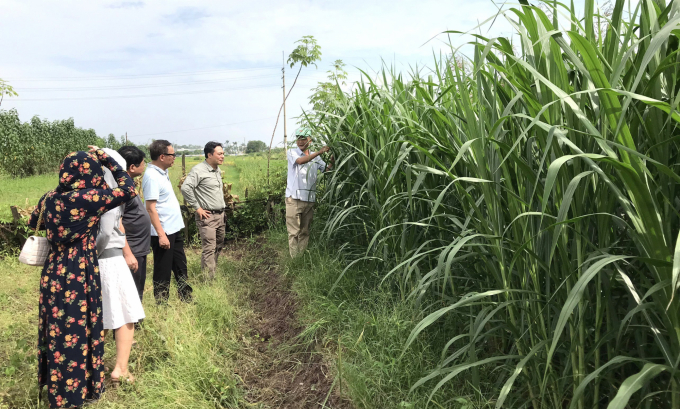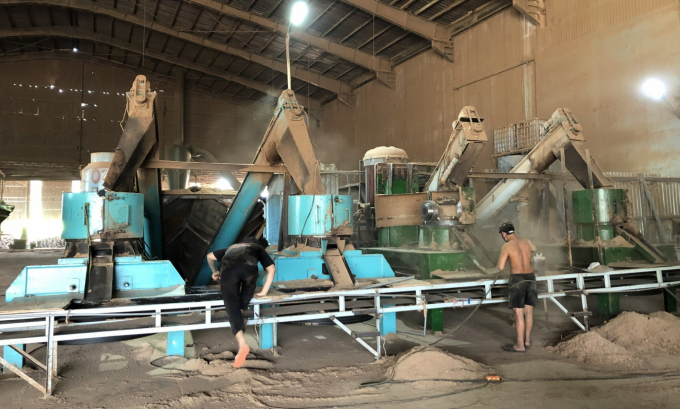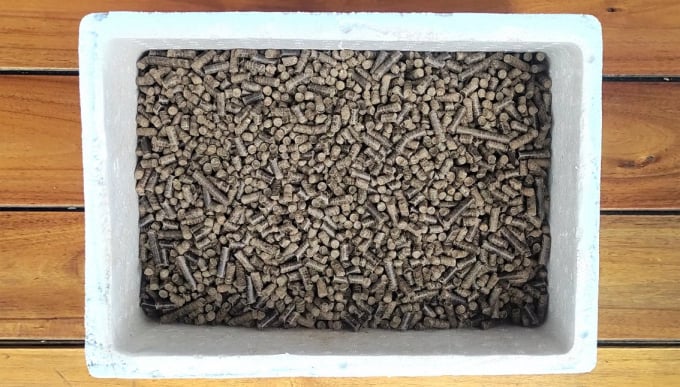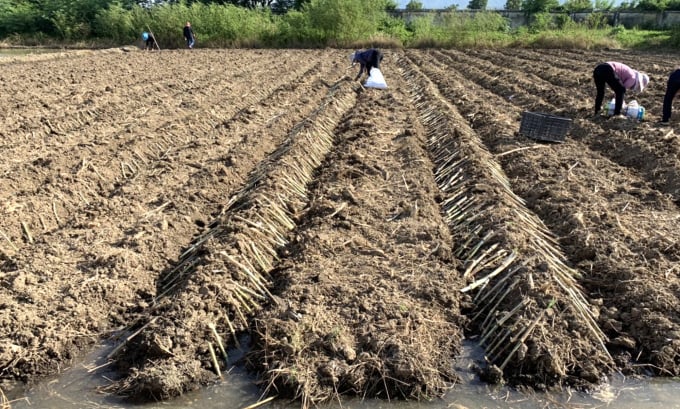May 30, 2025 | 02:37 GMT +7
May 30, 2025 | 02:37 GMT +7
Hotline: 0913.378.918
May 30, 2025 | 02:37 GMT +7
Hotline: 0913.378.918
Currently, there have been no in-depth studies on biomass crops. Science and Technology Enterprises - Vietseed Company Limited is know as one of the pioneers in the study of energy crops in Vietnam.
Vietseed established a team to do all research work from field trial to mechanization of planting, harvesting, processing and making fuel pellets out of elephant grass.

Leaders of the Department of Crop Production and scientists are visiting a testing field for VS-19 elephant grass in Gia Lam district, Hanoi. Photo: Bach Phong.
VS-19 is the elephant grass variety that Vietseeds eyed to manufacture pellets that can be used as a fuel source. This grass variety is selected by Vietseed and approved for circulation in October 2021. The VS-19 variety is widely adapted, high yielding and economic, in accordance with the definition of special-purpose biomass crops.
Especially, this VS-19 elephant grass can be harvested regularly with stable quality of raw material and low production cost. This variety of elephant grass can overcome the drawback of vegetal materials produced in croplands and forests such as straw, rice husk, sawdust, firewood which have been more and more scarce and expensive amid global energy crisis.

Trial pellet fuel production from elephant grass biomass in Dong Nai. Photo: Bach Phong.
With the samples of VS-19 elephant grass-made fuel pellets collected from Hanoi, Khanh Hoa and Ninh Thuan in 2022, the testing results showed that heating values are 3.593 - 3.954 and 3.850 Kcal/kg respectively; ash ratio are 6.97 – 8.27 and 5.57% respectively, Sulphur contents are 0.167 - 0.062 and 0.169% respectively; Nitrogen contents are 1.32 – 0.05 and 1.04; CO2 fixation rates range between 16% and 18%.
“Initial results show that the above quality parameters for pellet fuel made out of VS-19 elephant grass are suitable for being used as fuel for thermoelectric generators, steam boilers and heaters,” said Dinh Thanh Long, Director of Lu Gia Commodities Company Limited and an experienced expert in fuel trading in Ho Chi Minh city.

Elephant grass-made fuel pellets. Photo: Bach Phong.
To ensure the success of mass-production of pellet fuel from elephant grass biomass, Vietseed will continue to closely work with Nha Ho Research Institute for Cotton and Agricultural Development based in Ninh Thuan province on studying, experimenting and overcoming inherent weakness of elephant grass as well as processing fresh material.
At the same time, they will try to mechanize some stages of elephant grass production including growing, harvesting and post-harvest processing for fuel pellet production; identifying the connection between dry matter, recovery rate and the quality of finished fuel pellets; finding solutions to increase the lifespan of remained roots and replanting the area of dead roots from the second year after planting. In tandem with that, technologies that optimize drying of grass, crushing and pressing pellets suitable to the characteristics of grass biomass production will be tested.

A trial elephant grass field for in-depth study in Ninh Thuan on June 2022. Photo: Bach Phong.
In addition, based on its long-term orientation, Vietseed has started different programs such as adopting bio-technology in propagating elephant grass to reduce the cost of new planting and expand growing area; collecting and evaluating genetic resources; developing and selecting new elephant grass varieties; testing New Guinea-VS variety; analyzing CO2 absorption, aiming at net zero carbon.
“Based on the research findings we can come up with some useful solutions for improving farming productivity and effective use on the existing area of grass grown specifically as animal feed,” said Le Dang Hung, Deputy Director of Vietseed.
Translated by Mai Tham

(VAN) FAO’s Director-General addresses the 5th Baghdad International Water Conference.
/2025/05/26/1716-4-nongnghiep-191706.jpg)
(VAN) Chain linkages, technological innovation, and raw material zoning are three strategic pillars for the coconut industry to strongly develop and elevate its position on the global agricultural map.
![Advanced mariculture – an inevitable trend: [4] Accompanied by scientists](https://t.ex-cdn.com/nongnghiepmoitruong.vn/608w/files/sohk/2025/05/13/1941-pgsts-vo-van-nha-140958_717.jpg)
(VAN) According to Assoc. Prof. Dr. Vo Van Nha, Director of the RIA III, the development of advanced offshore mariculture is no longer an option but an essential path for Vietnam’s fisheries sector.

(VAN) Vietnam is intensifying the development of mollusk farming areas that meet international standards, aiming for sustainable growth and enhancing its export position in the global seafood market.
![Advanced mariculture – an inevitable trend: [3] Policy-driven momentum](https://t.ex-cdn.com/nongnghiepmoitruong.vn/608w/files/doanhtq/2025/05/21/0104-0616-0348-nuoi-bien-170339_789.jpg)
(VAN) To ensure the success of offshore mariculture that uses advanced technologies, it is essential to establish supportive policies that inspire both individuals and enterprises to invest with confidence.
![Advanced mariculture – an inevitable trend: [2] Outstanding results](https://t.ex-cdn.com/nongnghiepmoitruong.vn/608w/files/sohk/2025/05/12/4632-4136-nuoi-bien-11-164117_819.jpg)
(VAN) Pilot models of high-tech offshore mariculture in Vietnam, particularly in the South Central Coast region, have demonstrated exceptional economic returns and sustainability, setting a new direction for the country’s aquaculture industry.
![Advanced mariculture – an inevitable trend: [1] Moving offshore](https://t.ex-cdn.com/nongnghiepmoitruong.vn/608w/files/phucpm/2025/05/18/0252-2436-nuoi-bien-6-162148_783.jpg)
(VAN) Mariculture using advanced technology and moving offshore is an inevitable trend, as nearshore areas increasingly reveal limitations.